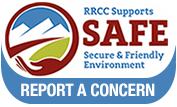Employment Services
Click Here to view all our Fall 2023 Career Success Workshops
Looking for a Job?
Red Rocks Community College is now on Handshake, the leading job board platform!
We are excited to announce our transition to a new platform to connect students and graduates to career opportunities. Handshake is the #1 way college students find jobs.
RRCC students and graduates now have exclusive access to Handshake, the #1 career platform! Click here(link is external) to watch a video to learn more. Check our website for more information about info sessions to learn how to navigate the platform, search for career opportunities, post your resume, attend events such as virtual and in person Career Fairs, and more!
Current students: Log in to Handshake (click the link, or find it under "My Student Stuff" on The Rock) using your S-number.
Graduates: Create an account using your preferred email address and request to be added to our school. We will process your request within three (3) business days.
 Resume
Resume
Resume - What is it?
A resume is a brief written account of one’s employment history, used when applying for a job, internship, and/or volunteer opportunity.
It is many times the first impression that you provide a prospective employer with, not only the first, but also one of the most crucial steps you take in your job search.
A resume is your personal promotional tool that outlines your skills and experiences that an employer can see, at a quick glance, how you can potentially contribute to their company or organization.
How to get started
Choosing the correct type of resume will depend on your personal job-search situation.
- People who can show a significant work history may choose the chronological resume as the one that best fits their personal situation.
- The functional or skills-based resume, which allows you to play down gaps in your experience, is especially well-suited for people entering the job market for the first time or when changing careers from one industry to another.
What do I include on my resume?
Name and current contact information (Primary phone and professional email only; no longer any need to include your physical address)
Profile/Skill Summary - (Shouldn’t I use an Objective Statement? No. Write a clear/concise objective in your cover letter!)
Education
- Degree & Institution
- Major(s) & GPA
Related Experience - use action verbs (administered, assisted, budgeted, completed, gained, inspected, reduced, organized, upgraded, structured, etc.) and avoid using first-person pronouns (I, We)
- Jobs
- Internships/Volunteer Work
Resume Tips
- 1-2 page resume—depending on experience and your professional field
- Emphasize skills, results, and contributions
- Eliminate fluff while giving enough information
- Quantify and qualify, use technical language if appropriate
- Do not use a MS Word template - it is hard to make changes when needed
Resume Worksheets/Samples
Chronological Resume worksheet – getting started
Functional/Skills-Based worksheet
Sample Resume #1
Sample Resume #2 - No work experience
Sample Resume #3 - Brief work history
Sample Resume #4 - 10+ years of work experience
 Cover Letter
Cover Letter
A cover letter is a persuasive letter to introduce you to an employer and match your skills and abilities with what the employer is seeking.
Many career experts agree that sending a cover letter is very useful. In fact, many recruiters say they will not read an applicant’s resume until they first read their cover letter. They are interested to see that the person 1) writes proficiently and 2) if they are able to persuade them to know more about how they might meet their hiring needs.
If you are able to communicate well in these two areas, you can definitely separate yourself from other candidates that don’t give the time and energy to write a well-written and persuasive cover letter.
What to include in a cover letter
- Proper salutation (do not assume or guess gender)
- 1st paragraph: Why are you writing? What specific position are you applying for? How did you learn about the position? Get their attention
- Body of letter: Briefly summarize some of your strongest qualifications. Match your skills to the employer’s needs and show how you would be a good fit for them
- Closing paragraph: Refer the reader to your resume. Declare you interest in an interview and offer to provide additional information upon request
Cover Letter Worksheet/Sample
Reference Page – Don’t these go on the resume?
As a rule, you should NOT include your job reference page with your resume. Why? It’s a matter of keeping the information private. Your references have agreed to let you give their contact info to your potential employers. But they most likely don’t want that info sent out to just anyone who says they have a job opening. Protect the privacy of your references by giving their contact info only to employers you know and trust.
 Job Search Strategies
Job Search Strategies
1) Define what you want vs. what is realistic
- What is your “ideal job?” Small company? Large?
- Industry—corporate, non-profit, government?
- What is/are your preferred roles and responsibilities in a job?
- Salary and benefits? Work environment? Geographic location?
- What time frame do you have for finding a job?
Research jobs within these parameters, make a list/print off interesting positions that you find that meet your search criteria
2) Identify your applicable and transferable skills
- Identify current and transferable skills that you have learned through your previous jobs, internships, classes, group memberships, volunteer work, and hobbies
- Some examples of transferable skills include leadership, organization, and communication skills
- Build desired skills by doing any of the above or taking a class or workshop
3) Start your search with Handshake
- Search/apply for jobs, internships, and volunteer opportunities 24/7 from organizations interested in RRCC students and alumni
- RRCC’s online job system offered through the Career Success Center
4) Use job search links
- There are dozens of job links that can help you find the right job. The Career Services website contains links to local and Colorado jobs as well as industry and career specific jobs
 Professional Networking
Professional Networking
The vast majority of job openings are never advertised; they’re filled by word of mouth. That’s why networking is the best way to find a job.
Unfortunately, many job seekers are hesitant to take advantage of networking because they’re afraid of being seen as pushy, annoying, or self-serving. But networking isn’t about using other people or aggressively promoting yourself—it’s about building relationships.
10 Tips for Successful Networking
- At a networking event, first and foremost, try to relax. Think of it as a chance to make new friends, so try to smile and be yourself and people should be drawn to you accordingly.
- If you see someone standing alone, go up and introduce yourself. Many others will feel just as nervous as you do so break the ice with a welcoming smile and “Hello”.
- Ask yourself what you would like to get out of the networking meeting. Remember to be open-minded and take a long-term view. Some meetings are based more on learning or gaining inspiration rather than on career opportunities and openings alone. Remember it is better to make 3 good contacts than 20 rushed ones.
- Develop an elevator speech. This is essentially a short summary of who you are and what you do that should be able to be delivered within the time span of an elevator ride. Be able to describe who you are professionally and the benefits you might bring. Intend for this to be captive and value-adding, with the hope to attract interest for the conversation to continue or for future interactions.
- Remember that networking is not supposed to be aggressive. Just as you can’t stand an overbearing sales person nagging at you, be wary that you aren’t bombarding others. A pushy attitude may drive networkers away for good.
- Ask Questions. This is your chance to learn as much as you can so take advantage of the opportunity - you will only get out what you put in. Have some questions ready to ask – for instance – What do you see as the main issues for your industry right now? What would you tell someone thinking of entering this profession?
- Be a good listener. Encourage others to participate in the conversation and make sure that you are alert throughout their responses. Act as a sponge and attempt to soak in everything that is being said. You will be thankful later when you try to recall what you have learned!
- There is an increasing trend by employers to use employment agencies or staffing services to do their initial screening for jobs. Consider one in your area with a good reputation and experience in your industry.
Pros
- A temporary assignment may turn into a career position
- You are not committed to the job. Good way to explore
- You have flexibility
- You will earn while you learn
Cons
- Benefits for temp work are usually not as good
- An assignment may end abruptly
- You may find pressure to take a position you do not want
9. Follow-up is the key. If you say that you’ll call or be in touch in anyway, make it your priority to do so promptly.
10. Ensure that your online profile at LinkedIn or Facebook is always up-to-date. Recruiters often use social media to research potential candidates and review your skills and experience.
 How to Best Prepare for an Interview
How to Best Prepare for an Interview
Before the Interview – the 3 R’s
Research – gather information about the position, organization, and the industry through company websites, job descriptions, annual reports, trade journals, newspapers, and magazines
Review – use the job description as your guide for the skills and qualities necessary for the specific job. Form connections between your background and the position description. Establish specific examples that illustrate your relevant skills.
Rehearse – Practice responses to frequently asked questions with a friend or schedule a practice interview with the Career Success Center. The purpose is not to memorize your answers, but to gain confidence in your ability to answer questions in an authentic manner and very your answer as needed.
At the Start of the Interview
During job interviews, you will want to be enthusiastic, likable, prepared, and informed. Provide a firm handshake and welcoming eye contact as most employers report their perception of you is strongly developed in the first 30 seconds. At this stage, these traits are all more important than your job qualifications. Because you know this and are well prepared, you can be confident that you will interview well.
The Actual Interview
Here are some strategies to use during the actual interview:
https://theundercoverrecruiter.com/10-killer-interview-tactics-you-ought-know/
Every candidate should be familiar with common Behavioral Interview questions, and how to respond. Here is a resource on common questions:
https://www.themuse.com/advice/30-behavioral-interview-questions-you-should-be-ready-to-answer
The STAR Framework is an excellent way to construct your best responses. Check out this helpful article on using the STAR Method:
https://www.thebalancecareers.com/what-is-the-star-interview-response-technique-2061629
After the Interview – Now what?
- Immediately email or write a thank-you note
- Reflect on how the interview went
- When should I follow up – give it a little time. Do not want to come across as too impatient or desperate
- Inform your references that they may be contacted
- Keep your job search going! You can’t be sure that you will get the job so stay active in looking for other jobs that meet your search criteria
How to Ask for a Raise and Navigate Salary Negotiation
Check out this helpful step-by-step guide to negotiating salary:
https://www.moneygeek.com/careers/resources/salary-negotiation/
Navigating Disability in the Workplace
https://www.moneygeek.com/careers/resources/workers-with-disabilities-and-ada/















